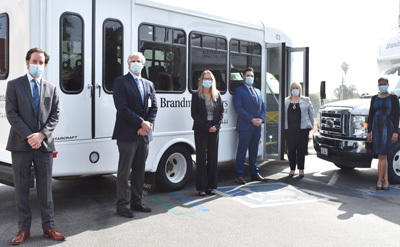Metro Steps up to Help the Jewish Home Deliver the Right Care at the Right Time in the Right Place


Metro Steps up to Help the Jewish Home Deliver the Right Care at the Right Time in the Right Place

Four new paratransit shuttle buses, whose purchase was funded by the Los Angeles County Metropolitan Transportation Authority, (Metro) were recently delivered to the Los Angeles Jewish Home. They join a fleet of shuttles utilized daily to transport more than 240 community residents to medical appointments, deliver meals and safely transport seniors to and from the Home’s Brandman Centers for Senior Care.
While several leaders from Metro have been working from home since the outbreak of Covid-19, they traveled to the Los Angeles Jewish Home, as they felt it was important to help celebrate the recent grant award which enabled the Home to purchase four new paratransit shuttle buses. The grant award of $259,200 funded the purchase of four paratransit buses to continue and expand Los Angeles Jewish Home capacity for transporting seniors to and from critical services, both residents of Los Angeles Jewish Home and those living in the surrounding community.
These new buses are critical to the care provided by the Home. The Brandman Center features a Program of All-inclusive Care for the Elderly (PACE), providing a broad range of benefits including high-quality, comprehensive medical and social services to seniors aged 55 and older. Services available at the Center allow seniors independence in the comfort of their own homes, even when health challenges may make them eligible for nursing home care. The Center offers a full continuum of care including: on-site primary medical care, preventive health services; physical rehabilitation; social work services; nutritional counseling; medications; supplies; and Adult Day Health Care filled with stimulating activities. These shuttles are equipped with special features such as electronic lifts for the ease of those requiring wheelchair access.
Present at the small, safe distance, event, held in front of two of the new shuttle buses, from Metro’s Countywide Planning and Development, Grants Management and Oversight department were: Executive Director, Shawn Atlow; Senior Director, Adam Stephenson; Senior Manager Anne Flores; and Manager Ruben Cervantes. Also joining the celebration was CEO and President of the Jewish Home Dale Surowitz and Steve Klappholz, Vice President of the Jewish Home Foundation. In recognizing the grant award Dale said, "We are extremely grateful for our continued partnership with Metro. Its ongoing support and assistance is helping to empower the seniors of this community to receive the vital support and health care they need, while also enabling them to continue residing in their own homes. This is truly a win-win for the seniors of Los Angeles."
"Metro is proud to partner with the wonderful Los Angeles Jewish Health programs that we were are able to support by leveraging Federal Transit Administration funds," said Shawn Atlow, Executive Officer for Grants Management and Oversight for Metro’s Countywide Planning & Development Department. "The Los Angeles Jewish Health leadership and staff graciously hosted Metro staff to see firsthand the impact of these investments. Metro is dedicated to improving mobility for all individuals throughout the County, and we look forward to continuing our successful partnership with Los Angeles Jewish Health." The Home’s partnership with Metro illustrates Metro’s commitment to meeting transportation needs where and when they are needed, especially during these challenging time.